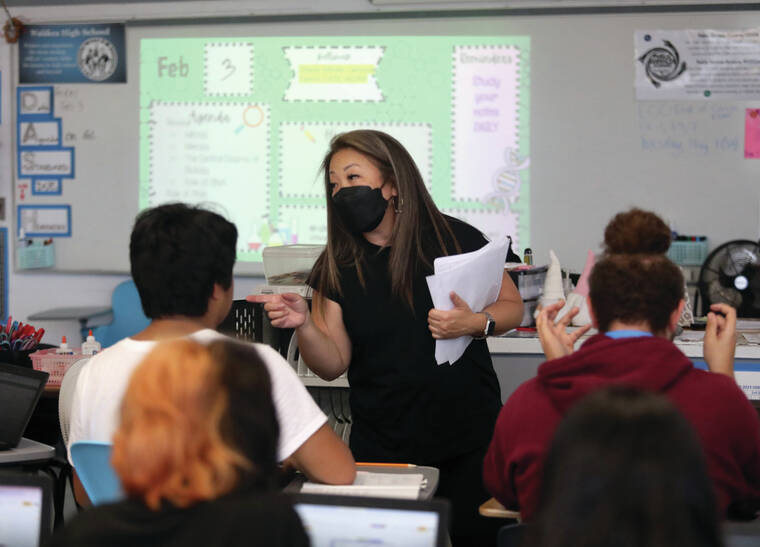Bill aims to ease licensing process for out-of-state educators
Hawaii is taking part in a multistate effort to address ongoing teacher shortages.
The proposal, addressed in House Bill 846, would create a “teacher mobility compact” and committee that would streamline the licensing process for those with out-of-state qualifications.
“Licensure can be a burdensome process, and we have a responsibility to do what we can to remove barriers to solving our teacher shortage problem,” said Hilo Rep. Chris Todd, a Democrat who co-introduced the bill. “This bill is an attempt to streamline the process.”
As of June 2022, the state Department of Education reported Hawaii County was short 196 classroom teachers, with 41 vacancies in the Hilo-Waiakea complex, 50 in the Ka‘u-Keaau-Pahoa complex, and 105 in the Honokaa-Kealakehe-Kohala-Konawaena complex.
According to the Hawaii State Teachers Association, the number of teachers leaving Hawaii has increased by more than 70% since 2012.
Regarding the measure, HSTA on Friday declined to comment.
In written testimony, DOE Superintendent Keith Hayashi favored addressing the shortage, but deferred to the Hawaii Teachers Standards Board regarding implementation of the proposed compact.
“The (DOE) acknowledges that there is a shortage of teachers for certain subject areas and rural or remote geographic areas which can lead to requiring the hiring of individuals who are not certified,” Hayashi wrote. “This compact may allow more licensed out-of-state teachers to be quickly considered for hiring in these areas.”
The Hawaii Teachers Standards Board currently requires teachers to have a bachelor’s degree and be licensed.
“In order for them to be actually employed with the department, they have to go and w ork with the Hawaii Teachers Standards Board in either receiving a license or permit,” DOE spokesperson Sean Bacon said Thursday during a House Committee on Education hearing. “If they do have the license or permit that’s been issued through the standards board, then they’re eligible to be working in the department.”
For the new compact to take effect, 10 states throughout the U.S. would need to approve it.
So far, Colorado, in addition to Hawaii, have voted to send the legislation forward in a hearing.
Additional statehouses considering the compact include Washington, Kansas, Georgia and Mississippi.
“Anytime there’s a bold new idea at the Legislature, it can take time to work out some kinks, and this bill may have a tough path ahead,” Todd said via email. “Whether it’s this year or in a future legislative session, I do believe there is support for this interstate compact model, and I’m hopeful we can see progress very soon.”
The idea was initially proposed by the U.S. Department of Defense as a way to support military spouses that travel and teach in various states.
During Thursday’s hearing, Oahu Rep. Amy Perruso noted that active-duty military members and their spouses are exempt from paying income tax if they are a state or county employee, adding the bill did not address whether or not these qualifying individuals could opt out as well.
Hawaii Teachers Standards Board Executive Director Felicia Villalobos deferred to the DOE during the hearing for employment-related issues such as the income tax question, and whether or not any union membership requirements would have to be met by transitioning teachers.
While Todd acknowledged the teacher shortage, he favored prioritizing local hires.
“My preference is we exhaust all options we have here, locally, to address our teacher shortage without importing educators from other states,” he said. “In a lot of ways, bringing in teachers from the mainland can feel like a band-aid due to poor teacher retention.”
Other factors creating low retention rates include the cost of living and the average annual salary for public school teachers in Hawaii.
A 2022 report from WalletHub listed Hawaii as the worst state in the nation for teachers when analyzing 24 key metrics. Hawaii had the lowest annual salary for public school teachers, listed at $47,156. It also had a lower average starting salary, listed at $33,327.
In comparison, the National Center for Education Statistics lists the national annual salary average for teachers at roughly $65,000, about $18,000 more than the state’s average.
“This bill will not solve the entirety of our teacher shortage problems,” said Todd. “But it could be part of a more comprehensive solution.”
Email Grant Phillips at gphillips@hawaiitribune-herald.com.


